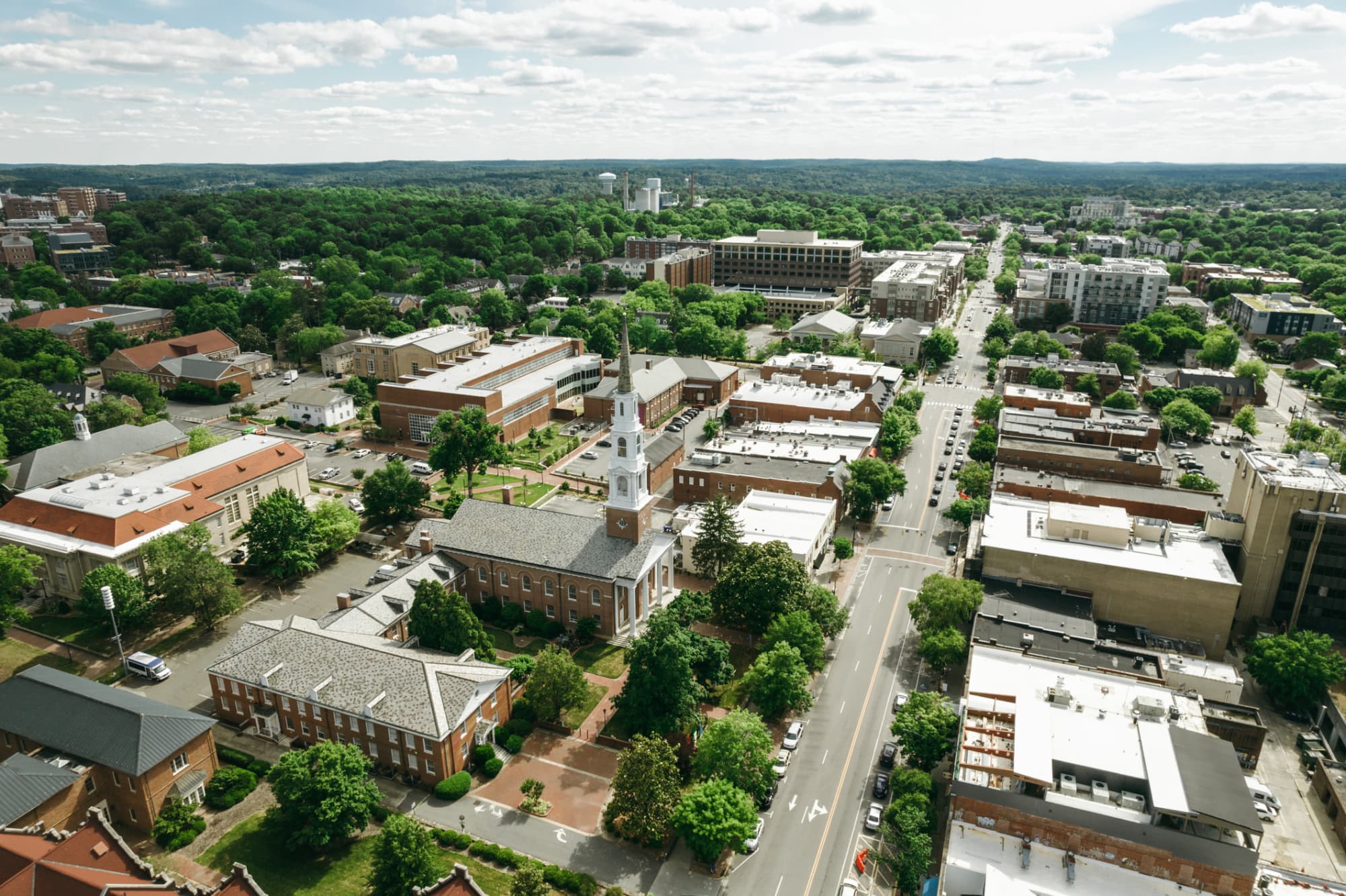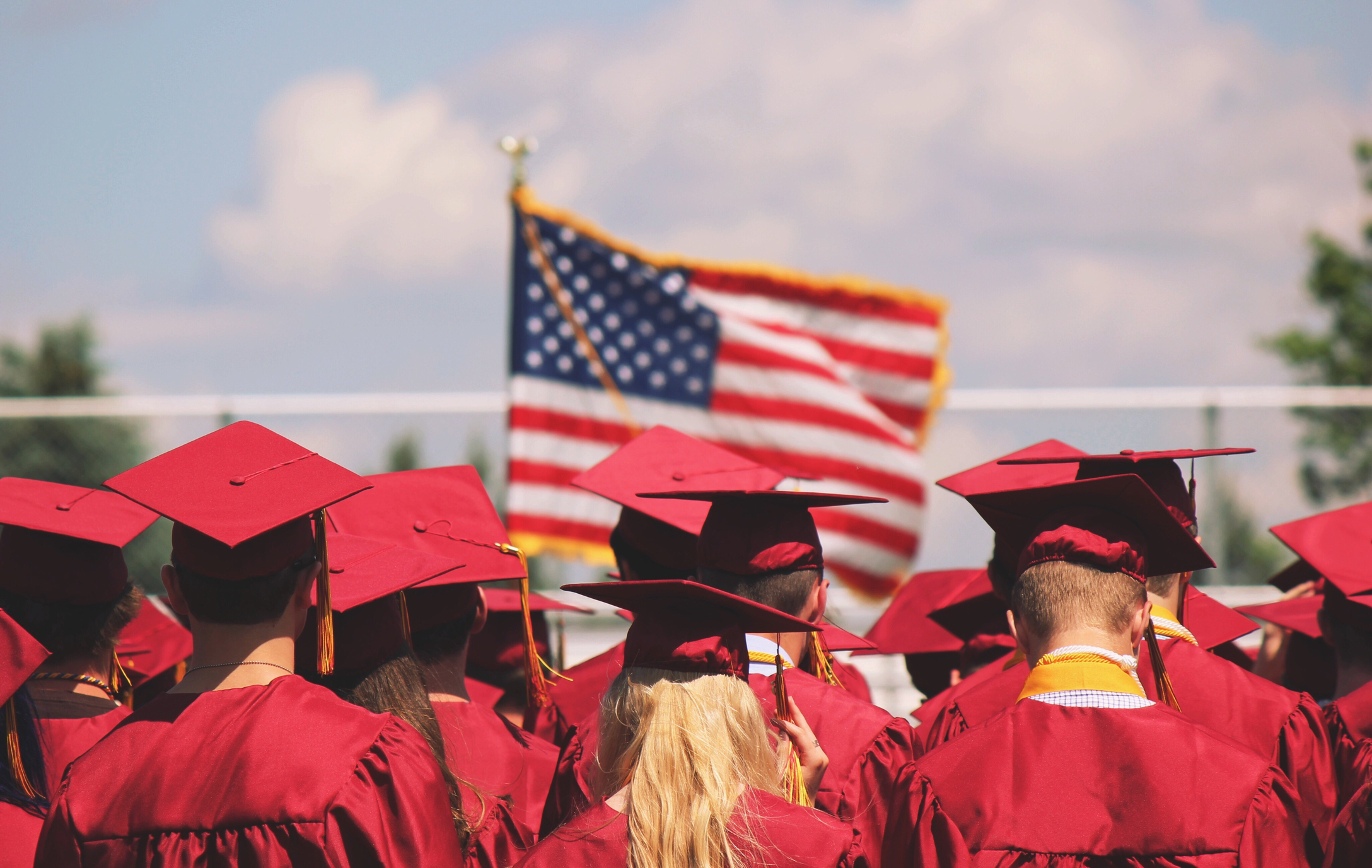CollegeChoice.net is an advertising-supported site. Featured or trusted partner programs and all school search, finder, or match results are for schools that compensate us. This compensation does not influence our school rankings, resource guides, or other editorially-independent information published on this site.
Turn Your Dreams Into Reality
Take our quiz and we'll do the homework for you! Compare your school matches and apply to your top choice today.
The United States' first higher education institution — Harvard University — opened over 100 years before the country earned its independence. Early colleges and universities like Harvard solidified higher education's role in the new nation's emerging culture. In the late 18th century, public institutions like the universities of Georgia and North Carolina further expanded higher education access.
Today, education persists as a cherished American value. The National Center for Education Statistics projects college enrollment of over 19 million for the 2021-22 school year. Many students seek out historic institutions with rich pasts and notable alumni. Some learners look to historical colleges for programs geared toward specific identities and backgrounds. For example, some schools historically serve women, people of color, or certain religious groups.
This page highlights ten of the oldest and most historic colleges in America. We also explore the qualities that make these institutions great. Keep reading to learn more.
The Oldest and Most Famous Colleges in the U.S.
- Harvard University
- College of William & Mary
- Yale University
- University of Pennsylvania
- University of Delaware
- Princeton University
- Columbia University
- Rutgers University
- University of Virginia
- Wesleyan College
Qualities of Famous Colleges
What makes a college "historic?" Historic colleges often hold rich, deep pasts. Some of these institutions opened their doors before the Revolutionary War. Others pioneered specific academic fields. For instance, the University of Pennsylvania's Wharton School ranks as the nation's first business school.
Not all the oldest colleges date back as far as schools like Harvard. Some made their mark on history through noteworthy alumni. Many historic colleges educated presidents, politicians, Nobel Prize winners, and influential scholars.
Explore the links below to discover details about the 10 most historic colleges in the country.
Find Your Fit for the Best College Lifestyle

Best College Towns in America

Colleges and Universities with the Happiest First-Year Students

Best Historically Black Colleges and Universities

Best Restaurants for College Students

Safest Small Colleges and Universities in America

Safest Large Colleges and Universities in America

The Top 10 Schools for Studying Abroad

Best Schools for Veterans
The Best Historical Colleges and Universities
In selecting the schools below, we considered each institution's age and its noteworthy graduates, attendees, and faculty. We also factored in other unique and notable characteristics such as "firsts." Our list features some of the country's most famous colleges, including many of the oldest colleges in the U.S. and one of the world's first colleges for women.
Harvard University
Year Established: 1636
Most Known For:
- First college founded in the United States
- An Ivy League institution
- Its prestigious law school and scenic campus in the heart of Cambridge, Massachusetts
- Many campus buildings appear on the National Register of Historic Places
John Harvard, a graduate of England's Cambridge University, willed half his estate to a college founded in 1636, for which the first college in the new American colonies took him as its namesake. In 1755, the university graduated its first future United States president, John Adams.
During the Revolutionary War, some of Harvard's original buildings burned down, including the original Harvard Hall. Soldiers even used some of Harvard's buildings as housing during the war. Eight Harvard alumni signed the Declaration of Independence in 1776.
Today, Harvard enrolls more than 6,700 undergraduate students. The first college in America continues to earn high rankings in a variety of academic categories.
University of Pennsylvania
Year Established: 1740
Most Known For:
- Benjamin Franklin founded the university, serving as its president until 1755
- The first American higher learning institution to earn university designation
- First medical school in the colonies (1765)
- First student union and first double-decker college football stadium in the United States
The University of Pennsylvania is an Ivy League member and the oldest university in America. Ninety-seven percent of Penn's admitted students rank in the top 10% of their high schools' graduating class. Of the university's undergraduate students, more than 92% identify within underrepresented minority groups. As of autumn 2020, over half of Penn students identify as women.
Notable alumni include W.E.B. DuBois, Elon Musk, Warren Buffet, and celebrities Elizabeth Banks and John Legend.
UPenn's Climate and Sustainability Action Plan underscores the university's commitment to climate change prevention and carbon neutrality.
Wesleyan College
Year Established: 1836
Most Known For:
- The first college in the world chartered for female students
Wesleyan College opened in 1836 as the Georgia Female College. When it first opened, the college admitted enrollees as young as 12. Unlike many women's institutions of the time, Wesleyan offered a full math and science curriculum.
Some firsts at Wesleyan include the first ever English literature professorship in America in 1844, and the first "secret societies" (now known as sororities) for women. A Wesleyan graduate became the first woman in Georgia to earn a doctorate in medicine.
Today, Wesleyan still excels in liberal arts education. The college offers six graduate programs and more than 30 undergraduate majors. Students can now earn several Wesleyan degrees entirely online. Wesleyan enrolls about 700 students annually.
University of Virginia
Year Established: 1819
Most Known For:
- Founded by Thomas Jefferson as one of the original public Ivies
- UVA houses the oldest college debating club, the Jefferson Literary and Debating Society
- The campus still features many original buildings, including original dorm rooms, one of which housed Edgar Allen Poe
The University of Virginia (UVA) sits on a 1,682-acre suburban campus in Charlottesville, Virginia. Former president Thomas Jefferson founded the university in 1819. UVA maintains many of its historic traditions, including the longest continually running debate society in the country.
Since its founding, UVA has educated many influential alumni, including senators, ambassadors, governors, and state Supreme Court justices. The university taught famous names like Tina Fey and Katie Couric, and NFL player Chris Long. The legendary poet Edgar Allen Poe called UVA home for one term in 1826.
Today, UVA enrolls over 23,000 students. The school ranks as the fourth best public national university according to U.S. News & World Report.
College of William & Mary
Year Established: 1693
Most Known For:
- Both Thomas Jefferson and George Washington were students. Washington earned a surveyor's license and Jefferson earned a bachelor's degree
- The first American higher learning institution with a royal charter
- Campus features the United States' oldest standing college building, constructed in 1700
The College of William & Mary (W&M) holds the title as the second-oldest college in America, despite the college's charter being drafted before Harvard opened its doors. W&M boasts many other firsts for higher learning, including the first law school, the first Greek letter society, and the first student honor code.
One of only eight schools in the country considered a "Public Ivy," W&M operates one of the nation' oldest and most historic campuses. Non-presidential notable alumni include Glenn Close, Patton Oswalt, and Jon Stewart.
Today, the college enrolls just under 9,000 students in more than 85 academic programs.
Columbia University
Year Established: 1754
Most Known For:
- Oldest higher learning institution in New York state and fifth-oldest in the country
- Known for its home campus in New York City, where students enjoy urban living and nightlife
- Students take pride in the school's diversity
Located in the heart of New York City, Columbia University provides a prestigious lineup of academic programs. This Ivy League university offers a rich history and a beautiful campus, including an extensive library system.
Founded as King's College in 1754, the university took on its current name following the American Revolution in 1784. Columbia's law school opened in 1858, followed by the nation's first mining school in 1864. The mining school eventually evolved into the university's present-day School of Engineering and Applied Science.
Today, Columbia hosts over 31,000 students across multiple distinctive schools.
Yale University
Year Established: 1701
Most Known For:
- First scholarship program for graduate students
- Home to the oldest building in New Haven, Connecticut, now a National Historic Landmark
- Known for strong music and drama programs
- Famous for its elite status and its history of secret societies, including the Skull and Bones Society
An Ivy League member, Yale University offers rigorous academic programs and possesses many notable alumni. Since its establishment over 300 years ago, Yale wove itself into the fabric of American culture as one of the country's most influential higher learning institutions.
Famous Yale alumni include Hillary Clinton, Anderson Cooper, Lupita Nyong'o, Angela Bassett, and five United States presidents.
Today, Yale's diverse student body exceeds 14,000 learners and represents 120 countries. In fall 2020, the university admitted just 6.6% of first-year applicants.
University of Delaware
Year Established: 1743
Most Known For:
- President Joe Biden and First Lady Dr. Jill Biden both earned degrees at UD
- UD's first class included multiple signers of the Declaration of Independence
- One of the oldest public universities in the United States
Established as a school for clergy members in New London, Pennsylvania, the University of Delaware (UD) moved to its current location in Newark, Delaware in 1765. The university opened a women's college in 1914 and merged both institutions in 1921.
UD became the first American institution to offer study abroad programs starting in 1923. The university's study abroad opportunities send 30% of its undergraduates to over 40 countries each year.
Today, UD enrolls over 23,000 students across ten colleges and schools. Despite its large student body, the university boasts small class sizes with an average of 35 students per class. Ninety-five percent of UD's class of 2019 landed careers or moved onto further education.
Princeton University
Year Established: 1746
Most Known For:
- Fourth-oldest college in the United States
- Original Congress of the United States met in Princeton's Nassau Hall building
- Home to 21 Rhodes Scholars in the last decade alone
Like the other Ivies, Princeton University established itself as a household name in the United States. Princeton's history includes hosting the Continental Congress and serving as the United States Capitol for a short period following the Revolutionary War.
Today, Princeton enrolls more than 5,200 undergraduate enrollees and 2,900 graduate students. Over the years, Princeton's faculty has included 27 Nobel prize winners. Students benefit from a 5:1 student-to-faculty ratio, enjoying small classes and a tight-knit academic community. Princeton fosters this inclusive and communal space with a precept system that allows students to join small weekly discussion groups outside of their normal classes.
Rutgers University
Year Established: 1766
Most Known For:
- Eighth oldest college in the country
- Chartered prior to the Revolutionary War
- Champion of diversity and equitable access, enrolling the first Japanese student in a U.S. college in 1867
Rutgers University opened as Queen's College in 1766. Many Rutgers alumni played key roles in the War of Independence, including Simeon De Witt, who helped defeat the British at Yorktown. Alumnus James Schureman served in the first U.S. Congress.
Rutgers took on its current name in 1825. Its Newark and Camden, New Jersey, campuses opened in 1946 and 1950.
The Rutgers faculty roster includes Pulitzer Prize, Grammy Award, and Nobel Prize winners. Faculty publications include more than 40,000 credits in the last five years alone. Sixty-five faculty members hold places in the National Academies of Sciences, Engineering, and Medicine.
Rutgers' New Brunswick campus holds the U.S. World News & Report ranking for the number one public university in New Jersey. The university hosts over 71,000 students across its three campuses.
Check out other colleges in the same states:
Frequently Asked Questions
What is the oldest university in the United States?
Founded in 1636, Harvard University ranks as the United States' oldest university. Harvard is famous for its position in the Ivy Leagues and its prestigious law school.
Who created the first college in America?
The Court of the Massachusetts Bay Colony founded Harvard University in 1636. Harvard takes its name from the Reverend John Harvard, who donated his personal library and half of his estate to the school.
What is the second-oldest college in the U.S.?
The College of William & Mary in Georgia holds the title of second-oldest college in the country. Although the college opened after Harvard, W&M's charter was actually drafted before Harvard opened.
Does America have the best colleges?
The United States Department of Education recognizes over 4,000 colleges and universities, including some of the best colleges in the world. However, many other countries also host rigorous and historic institutions.
What are the 10 oldest colleges in the world?
Exact founding dates for the world's oldest colleges can be difficult to pinpoint. However, lists of the oldest colleges in the world typically include the universities of Karueein, Bologna, Oxford, Salamanca, Paris, Cambridge, Padua, Naples, Siena, and Coimbra.
Featured Image: joe daniel price / Moment / Getty Images
Recommended Reading
Helping you prepare and gain the most out of your educational experience.
